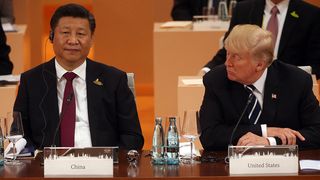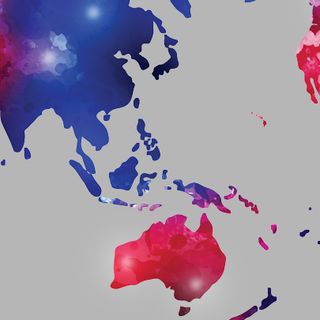There has never been more global interest in the leadership of the United States, nor US interest in global opinion about the American leadership. ABC political editor Chris Uhlmann's two-minute viral video assessment of President Trump's G20 performance at the weekend is yet another example of the demand for — and fascination with — opinion on the direction of US foreign policy.
Events of recent weeks — North Korea's missile tests and Trump's public disappointment with China's inability to slow North Korea's nuclear ambitions — are also reminders of what Australians have long understood: that the Indo-Pacific is the locus of the world's most pressing geo-political dilemmas and that the strategic tension between the United States and China is the definitive, international rivalry of our age.
The United States Studies Centre's second survey of attitudes on America's role in the Indo-Pacific was fielded in Australia, China, India, Indonesia, Japan and South Korea one month into the Trump presidency, with the assistance of other think tanks in the region. Comparisons with identical questions asked on our 2015 survey give us unique insight into how Trump's election changed attitudes toward the United States throughout the region.
There's no sugar-coating that perceptions of American influence have diminished in the wake of Trump's election. But our data also indicate that is largely a reaction to Trump per sé rather than a wholesale revision of Australian beliefs about its relationship with the United States. And with a few important exceptions, Australians have remarkably balanced assessments of the value of our relationships with the United States and China.
Largest mover
On three key measures, Australians — like others in the region — are less positive in their assessments of the United States. Respondents were asked to nominate the country with the most influence in Asia today. The percentage of Australians nominating the United States has fallen from 22 per cent to 11 per cent. Eighteen per cent of Australians say the United States does more good than harm in the Indo-Pacific, down from the 23 per cent giving that answer in 2015.
Australia's hardly alone on this score. Among other US allies in the region, assessments of American influence on the region and on specific countries have fallen. Japan and South Korea generally report very positive assessments of the influence of the United States on those respective countries, but with less ardency than in our 2015 survey. In Japan, positive assessments of American influence outnumber negative assessments 50 per cent to 20 per cent.
China is the largest mover on this dimension, with negative assessments of American influence there outranking positive assessments by 45 points, compared to just three points in 2015.
But it's not just the United States that faces headwinds in Australian public opinion. Australian assessments of China's influence on the region and on Australia have not become more positive in response to Trump's election – and have shown slight falls in some cases.
Forty per cent of Australians assess China's influence on Australia as positive, precisely the same proportion that assess the United States' influence on Australia as positive. This symmetry in Australian assessments of China and the United States remains unchanged from 2015.
Even-handed assessments
This even-handedness breaks down when we switch to specific issues such as trade, investment and military presence.
There are three big takeaways here. First, it is clear perceptions of US influence have generally declined, with respondents around the Indo-Pacific no doubt picking up on Trump's message of "America First". But in general, Trump's election hasn't shaken up evaluations of America's role in the Indo-Pacific as much as we thought they would.
Second, Trump notwithstanding, a decline in assessments of America's influence has not translated into more favourable ratings of China's role or influence in the region or on Australia in particular. In specific domains, such as investment and defence, more Australians prefer closer ties with the United States than with China.
Third, the tendency of Australians to give even-handed assessments of both the United States and China stands out in both our 2015 and 2017 surveys, a characteristic of Australian public opinion robust to Trump's presidency.
Australian respondents seem to be picking up on the language of "balancing" or "strategic hedging" employed by political leaders and policymakers from both sides of Australian politics.
China is our largest trading partner and its economic growth has been and will be valuable for Australia. Our alliance with the United States is the bedrock of our national security. Moreover, the United States is Australia's largest source of investment — and the single largest destination of Australian investment — another pillar of our prosperity. Both countries are vital to Australia, a view repeatedly expressed by Australians throughout our survey, irrespective of who occupies the Oval Office.
Read more analysis of the United States Studies Centre's Survey on America's Role in the Indo-Pacific.







